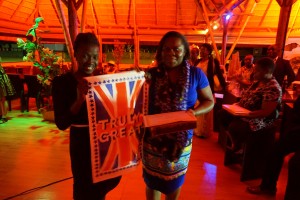The LINKUP project team has recognised the International Community of Women Living with HIV (ICWEA) with an award for engaging young women living with HIV as research assistants in the study on violations of Sexual and Reproductive Health and Rights (SRHR) of women living with HIV in Uganda.
The award for Most Participatory Research was handed to the ICWEA team on July 1, 2015 at the LINKUP Africa Regional Meeting that took place from June 28 to July 2, 2015 at Laico Lake Victoria Hotel in Entebbe.
A total 30 young women Young women living with HIV coming from the 9 districts where the research was to be conducted were trained as the Research Assistants and then engaged in data collection which involved mobilizing the research participants, screening over 700 women living with HIV in their reproductive age carrying out, in-depth interviews, FGDS and Transcribing data for the report writing process.
Rachel Nandelenga, the Sexual and Reproductive Health and Rights Officer and Brenda Facy Azizuyo, a young woman, who shared her experience as young woman who participated in the research processes represented ICWEA at the ceremony.
LINKUP is a project aiming at improving the SRHR of more than one million young people in Bangladesh, Burundi, Ethiopia, Myanmar and Uganda by addressing the SRH needs of young people at risk of or living with HIV (aged 10 -24) and to upbold their sexual and reproductive rights.
Funded by the Government of the Netherlands’ Ministry of Foreign Affairs (BUZA) through its Sexual and Reproductive Health and Rights (SRHR) Fund, the programme runs from January 2013 to July 2016 and draws on the strengths of a consortium of organizations including International HIV/AIDS Alliance, Gyca, Marie Stopes STOP AIDS NOW (SAN), International, Population Council.
ICWEA with support from SAN carried out the research on the violations of SRHR in for women living with HIV in HIV and SRHR clinical settings. The study sought to examine the existence of violations of rights of women of reproductive age living with HIV as they seek sexual and reproductive health services in clinical settings in Uganda; with focus on forced sterilization, among other SRHR violations.
Preliminary findings confirm that women living with HIV experience a range of violations including misinformation, mistreatment/abuse during the process of seeking reproductive health services especially maternal health services from health facilities, to coerced or forced sterilization.
The project also sought to build capacity of young women living with HIV to examine their own experiences from a gender-human rights lenses to engage in advocacy for their sexual and reproductive health rights.




